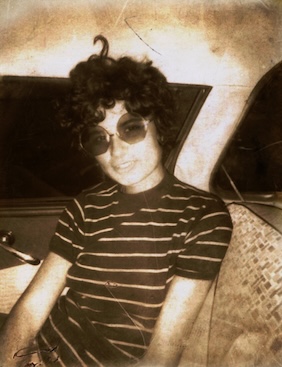My first job was changing labels at a pants warehouse in New Bedford, Mass. When an order came in that required, say, a hundred pairs of men’s size 32 W 32 L and the warehouse only had sixty, the pickers would bring a stack of 30 W 30 L. Or 34 W 28 L. Or frankly, anything close enough.
I ripped off the old labels neatly and sewed the new ones with this nifty machine.
Thanks for reading Joan Livingston Writes! Subscribe for free to receive new posts and support my work.
Sometimes the sizes weren’t even close. I remember an order of boys pants for a military PX down South. We scrambled to turn size 12 boys into size 8 and so on.
Because of that experience, I know better than to trust the label on an article of clothing. I have to try it on. You should, too.
Did I feel we were being dishonest? Of course. But I was 18 and waiting out that summer between high school graduation and my freshman year in college. I was going away from home for the first time, a big step for a shy girl. Every cent I made went in the bank.
My Dad called in a favor with the foreman, so I could get this job. I don’t recall how they knew each other but I do the Christmas tree the man gave our family one year. The tree’s needles all dropped within a couple of days and my mother took photos to record the experience.
I was paid minimum wage, which in those days was $1.60 an hour.
Once, New Bedford used to be a hub for textile mills. My mother’s parents, who came over the boat from Madeira, were weavers. So was my mother after her parents made her drop out of high school. By the time I came along, the textile mills had moved down South, where labor was cheaper. Now, they’re overseas.
So, what was left were distribution warehouses. Among their biggest clients were military bases all over the U.S. This was during the Vietnam War.
The warehouse where I worked was situated across the then-polluted Acushnet River from my hometown of Fairhaven. The stairwell had an interesting assortment of profane grafitti like “Maria sucks dead Portagees.” I’ll spare you the coarser stuff.
The building didn’t have air-conditioning so it got hotter as the day progressed. Large fans kept the air moving in the area near them but they didn’t help much for the rest of the building.
My co-workers were for the most part lifers. A few were young like me, including a friend from high school who worked in the office, but they weren’t going to college. I was mindful of that so I did my job and tried to be as friendly as necessary. I met some interesting characters for sure.
And I scored my first pair of bellbottoms, gratis, of course.
I worked two summers at this warehouse. When I went to the unemployment office on the third, I was sent to another pants warehouse. This time I was a picker who filled orders and made ten cents an hour more because the owner liked me.
About the photo above: That’s me after I became indoctrinated into the alternative scene at college but I still went home for the summer to work in a warehouse.






